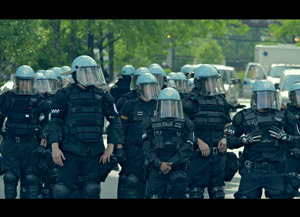Facebook May Join Forces With Police to Thwart Protests
Independent journalist Kenneth Lipp attended a law enforcement conference in Philadelphia on Monday in which he discovered that soon authorities may have control over what's posted on social media sites. This includes allowing people to plan demonstrations using sites such as Facebook.
Independent journalist Kenneth Lipp attended a law enforcement conference in Philadelphia on Monday in which he discovered that soon authorities may have control over what’s posted on social media sites. This includes allowing people to plan demonstrations using sites such as Facebook. Both Twitter and Facebook have proven to be indispensable tools for organization during movements such as the Arab Spring. But now it seems police officers want to find ways to obstruct protests, and they will likely do so with Facebook’s help. RT reports:
A high-ranking official from the Chicago Police Department told attendees at a law enforcement conference on Monday that his agency has been working with a security chief at Facebook to block certain users from the site “if it is determined they have posted what is deemed criminal content,” reports Kenneth Lipp…
Lipp reported throughout the week from the International Association of Chiefs of Police conference, and now says that a speaker during one of the presentations suggested that a relationship exists between law enforcement and social media that that could be considered a form of censorship.
According to Lipp, the unnamed CPD officer said specifically that his agency was working with Facebook to block users’ by their individual account, IP address or device, such as a cell phone or computer….
“Increasingly in discussion in workshops held by and for top police executives from throughout the world (mostly US, Canada and the United Kingdom, with others like Nigeria among a total of 13,000 representatives of the law enforcement community in town for the event), and widely available from vendors, were technologies and department policies that allow agencies to block content, users and even devices – for example, ‘Geofencing’ software that allows departments to block service to a specified device when the device leaves an established virtual geographic perimeter,” Lipp wrote. “The capability is a basic function of advanced mobile technologies like smartphones, ‘OnStar’ type features that link drivers through GIS to central assistance centers, and automated infrastructure and other hardware including unmanned aerial systems that must ‘sense and respond.’”
…Bloggers at the website PrivacySOS.org acknowledged that former federal prosecutor-turned-Facebook security chief Joe Sullivan was scheduled to speak during the conference at a panel entitled “Helping Law Enforcement Respond to Mass Gatherings Spurred by Social Media,” and suggested that agencies could be partnering with tech companies to keep users of certain services for communicating and planning protests and other types of demonstrations. A 2011 Bloomberg report revealed that Creativity Software, a UK based company with international clients, had sold geofencing programs to law enforcement in Iran which was then used to track political dissidents. US Senator Mark Kirk (R-Illinois) told Bloomberg that those companies should be condemned for being complicit in human rights abuses. And while this week’s convention in Philadelphia was for law enforcement agencies around the globe, it wouldn’t be too surprising to see American companies adopt similar systems.
Lipp also pointed to an alarming statistic regarding the relationship between social media and crime assessment: “95.9 percent of law enforcement agencies use social media, 86.1 percent for investigative purposes.”
At this rate, with the NSA snooping through all our personal correspondence, and the police and social media in cahoots to eliminate the right to assemble, all that will be left of the First Amendment is a memento from the pre-Internet era.
—Posted by Natasha Hakimi
Your support matters…Independent journalism is under threat and overshadowed by heavily funded mainstream media.
You can help level the playing field. Become a member.
Your tax-deductible contribution keeps us digging beneath the headlines to give you thought-provoking, investigative reporting and analysis that unearths what's really happening- without compromise.
Give today to support our courageous, independent journalists.






You need to be a supporter to comment.
There are currently no responses to this article.
Be the first to respond.